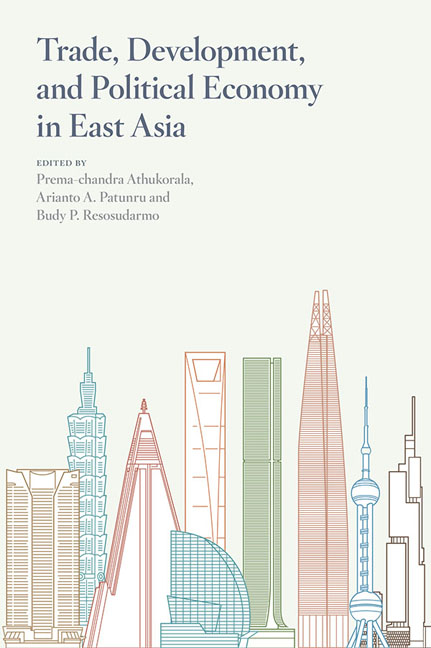Book contents
- Frontmatter
- Contents
- Tables
- Figures
- Contributors
- Foreword
- Acknowledgments
- Glossary
- 1 Introduction
- PART 1 TRADE
- PART 2 DEVELOPMENT
- PART 3 POLITICAL ECONOMY
- 11 Rethinking the role of the state in ASEAN
- 12 The ill-fated currency board proposal for Indonesia
- 13 What are grain reserves worth? A generalised political economy framework
- References
- Index
11 - Rethinking the role of the state in ASEAN
from PART 3 - POLITICAL ECONOMY
Published online by Cambridge University Press: 19 May 2017
- Frontmatter
- Contents
- Tables
- Figures
- Contributors
- Foreword
- Acknowledgments
- Glossary
- 1 Introduction
- PART 1 TRADE
- PART 2 DEVELOPMENT
- PART 3 POLITICAL ECONOMY
- 11 Rethinking the role of the state in ASEAN
- 12 The ill-fated currency board proposal for Indonesia
- 13 What are grain reserves worth? A generalised political economy framework
- References
- Index
Summary
INTRODUCTION
Our colleague Hal Hill is one of Australia's most well-known economic scholars on growth and development in Asia. He spent much of the first part of his academic career exploring development issues in Asia through the lens of his work on Indonesia. More recently, since the mid-1990s, he has broadened his work on development issues in Asia into numerous studies of economic challenges in other key ASEAN countries. He is now widely recognised internationally as one of the world's leading specialists on ASEAN economic issues. And for those of us who know and work with Hal, he is not only an immensely knowledgeable scholar on development issues in the Southeast Asian region, he is also a warm and generous friend.
On a more personal note, I remember clearly my first contact with Hal. It was in 1975 when I was working as an advisor in Parliament House in Canberra. Entirely out of the blue, an unexpected piece of correspondence arrived amidst the welter of official papers that flowed through the parliamentary office. It was a letter from Hal Hill, who had recently completed a Master's degree at Monash University. He said that he was interested in the possibility of studying for a doctoral degree at the Australian National University (ANU), perhaps specialising on the Indonesian economy. He asked for suggestions. I wrote back encouraging his interest in Indonesian studies. Hal quickly replied (in a letter, of course, because there was no such thing as email in the mid-1970s) saying that he had decided to delay a start on doctoral studies for a year or so, but that he would be in touch again later. I returned to the ANU in early 1976. Before too long, Hal had followed up his earlier enquiries and the head of our department, Professor Heinz Arndt, was very glad to be able to welcome Hal into the department as one of his family of PhD scholars working on the Indonesian economy.
In recognition of Hal's long interest in development issues across Asia, and especially his work on various ASEAN economies, it seems appropriate to discuss some aspects of a key topic in public policy for the region—the capacity of ASEAN states to meet the performance goals expected of them.
- Type
- Chapter
- Information
- Trade, Development, and Political Economy in East AsiaEssays in Honour of Hal Hill, pp. 199 - 215Publisher: ISEAS–Yusof Ishak InstitutePrint publication year: 2014

